The pulmonary embolism "reality gap"According to the peer-reviewed medical literature, COVID vaccination reduces your risk of pulmonary embolism. According to the doctors, nurses, and pathologists I know, it does the opposite.Executive summaryPulmonary embolism (PE) as a side effect of the COVID vaccine is a perfect example of what I’ll call the “reality gap” between mainstream medicine and direct observations of people. The medical community estimates, using large data that is kept hidden from public view and both partial and fully adjusted hazard ratios (HRs), that the COVID vaccines reduce your risk of pulmonary embolism by around 20%. The proposed mechanism of action for that miracle is that the vaccine reduces your risk of getting COVID (which can elevate PE levels). On the other hand, all the medical experts I regularly communicate with believe the reverse is true. And we have other supporting data as well: nearly all the PE reports in VAERS are associated with the COVID vaccine and there are over 15,000 reports. Since VAERS is at least 50X under-reported, this suggests around 650,000 PE’s associated with the COVID vaccine. That’s a train wreck. In addition, I did a survey of my followers on X, 80% of whom did not take the COVID vaccine, and the results were consistent with the safety signal in VAERS: 85% of all the PE cases people observed after 2021 were associated with the COVID vaccine. Someone is not telling you the truth. This article looks at the arguments on both sides. The evidenceWithout exception, all the medical experts I interact with (doctors, cardiologists, nurses, and pathologists) have observed alarming increases in clotting events after the COVID shots rolled out. If the COVID vaccines reduce the risk of PE, this seems unlikely that there would be such consensus among this group of very independent thinking medical professionals. Here’s the VAERS data on pulmonary embolism reports. In the entire history of VAERS, nearly all the PE reports are only associated with one vaccine: Here’s the survey I did. I asked for people’s opinion on the cause of a PE that they were familiar with: So we have 752 independent observers and the results are striking: 11X more likely the PE was associated with a COVID vaccine than the COVID virus. Note that 80% of my followers who responded to my survey didn’t take the COVID shots: So both VAERS and the people I surveyed indicate that the COVID vaccine was a major driver of the pulmonary embolism reports. The new paper in Nature Communications: color me skepticalI posted about this paper because I noted it showed that the COVID vaccine reduced the risk of PE! This is counter to an estimated hundreds of thousands (or more) who have reported blood clots associated with administration of the COVID vaccines: The paper claims COVID shots reduce your risk of PESee page 10 in the supplement of the paper published in Nature Communications which shows around a 20% hazard reduction in the risk of getting a PE if you got the Pfizer shot. So if anything the PE risk associated with the COVID vaccines should be lower than other vaccines in VAERS. Explaining the mechanism of action by which the COVID vaccines could reduce your risk of PEDr. Jonathan Laxton explained the mechanism of action for PE reduction to which I responded: So I wasn’t convinced by his explanation. If Laxton was correct, I’d mostly be hearing PE stories from people who didn’t get the shots. Resolving the conflictNext I posted the conflict and ask for comments on which source do you believe: So “Stick of Facts” said I should believe the medical community. I asked why and was told that I shouldn’t believe anything that people see with their own eyes as that is not “data” in their opinion. Apparently, because the respondents to my survey are not trained medical experts, their observations should be completely ignored and don’t have to be explained. That’s nice, but it simply doesn’t explain why I should also ignore the professional observations of top doctors such as Peter McCullough, Aseem Malhotra, Paul Marik, Pierre Kory, Ryan Cole, and others who all are saying the same thing as the X surveys reveal. So my professional friends in the medical field are observing massive blood clots caused by the vaccine in actual patient samples, but the big data after adjustment in mathematical models says the COVID vaccines are reducing the PE risk. An 11X higher rate of PE among the vaccinated vs. infected seems like a pretty clear signal to me, but that’s just my opinion. You’ve heard the arguments from both sides now. What do you think?
If you think the COVID vaccines reduce your risk of PE, please let me know your reasoning and explanation for how the medical experts, VAERS data, and the X survey respondents all got it wrong.
SummaryDid COVID vaccines increase your risk of pulmonary embolism? The answer is important. It all boils down to who do you trust: your own eyes, observations of independent medical experts, observations of your peers vs. the UK data that none of us are ever allowed to see? This is a referendum on whether the studies the medical community relies upon are accurate or not. We claim this is a huge safety signal and they claim the opposite. How can there be a reality gap? There must be a reason why all these papers rely on data that is never made publicly available? And there must be a reason why the CDC and every other health authority in the world don’t allow anyone who opposes the narrative to access that data; all the people I know get an “access denied” response whenever they ask so they’ve stopped asking. I guess it improves health outcomes to keep the data under wraps. A final note: Have you noticed that none of the people who believe the vaccines are safe and effective (including the drug companies themselves) have ever called for data transparency of public health data? Until there is full data transparency, I’m personally trusting the direct observations of my friends in the medical community (doctors, nurses, and pathologists) who all tell me a very consistent story that the COVID vaccines increase clotting and adverse events such as pulmonary embolism. What those professionals tell me is consistent with what VAERS says, what funeral directors are telling me in private, and is also consistent with what the various surveys show as well. You're currently a free subscriber to Steve Kirsch's newsletter. For the full experience, upgrade your subscription. |
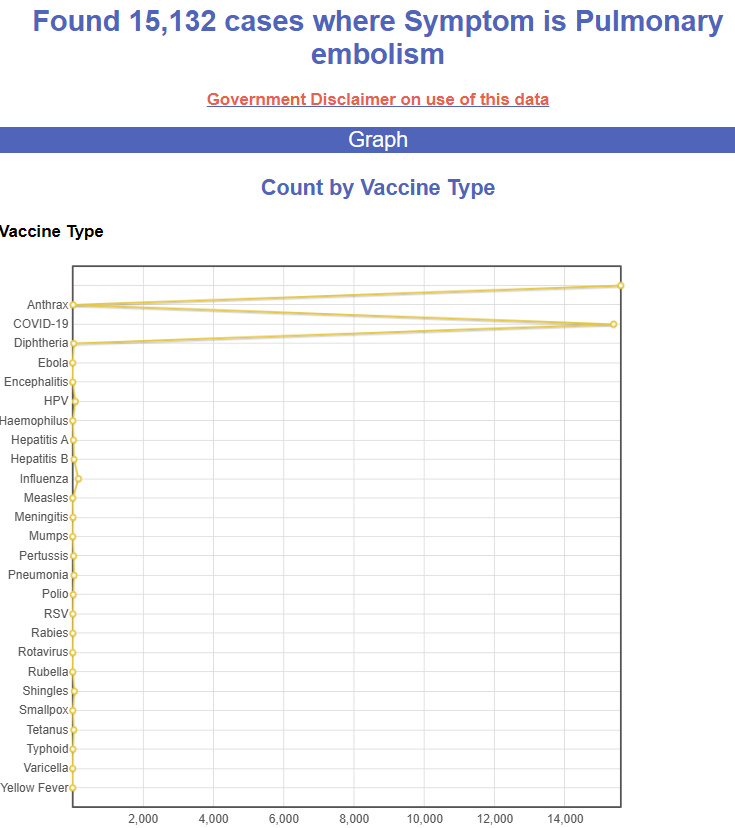
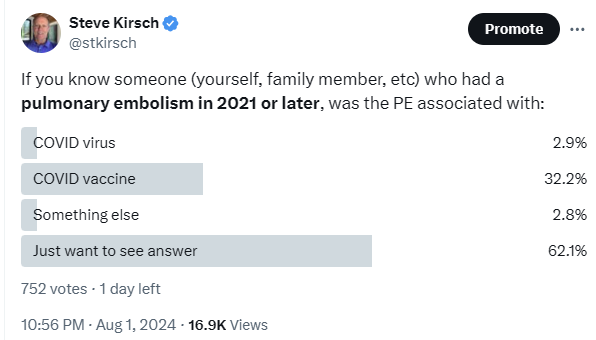
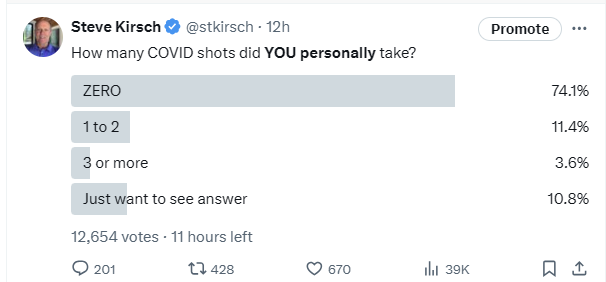
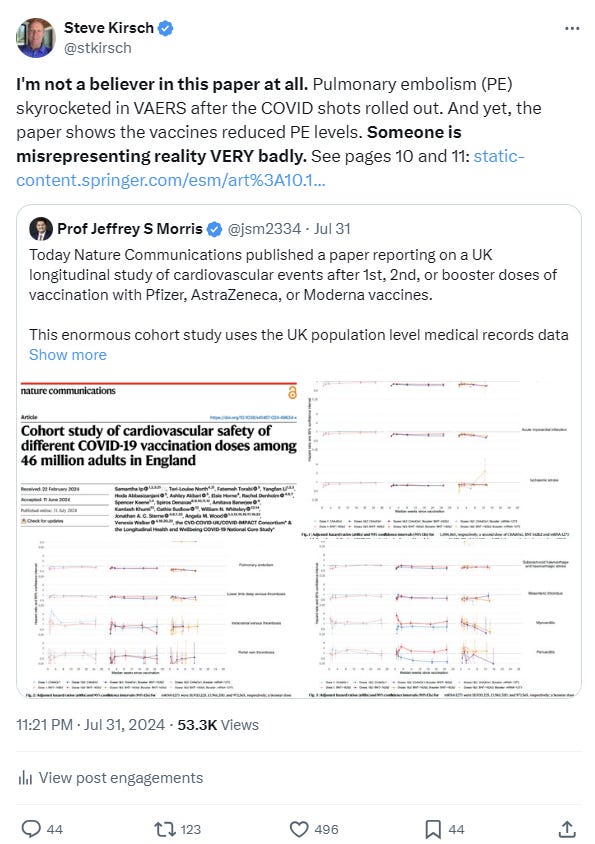

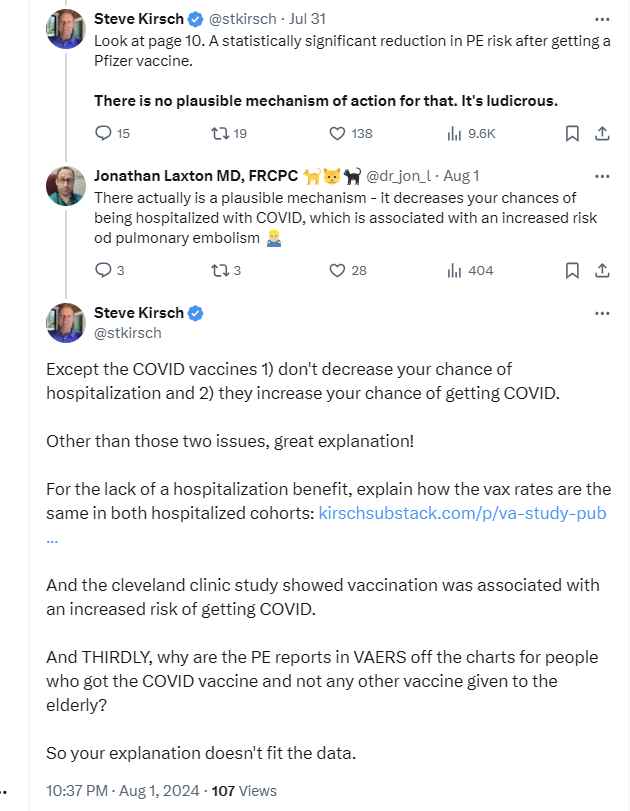
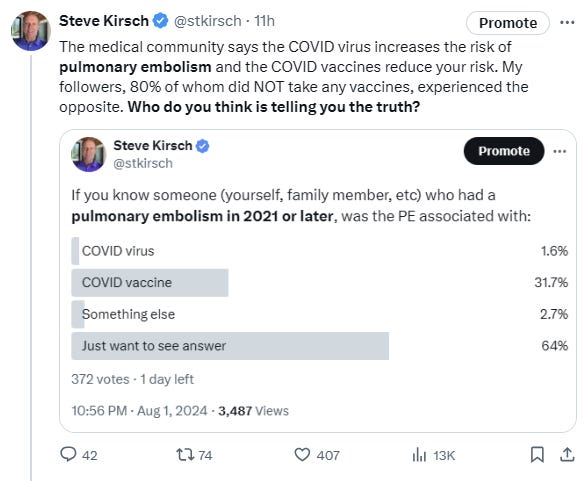
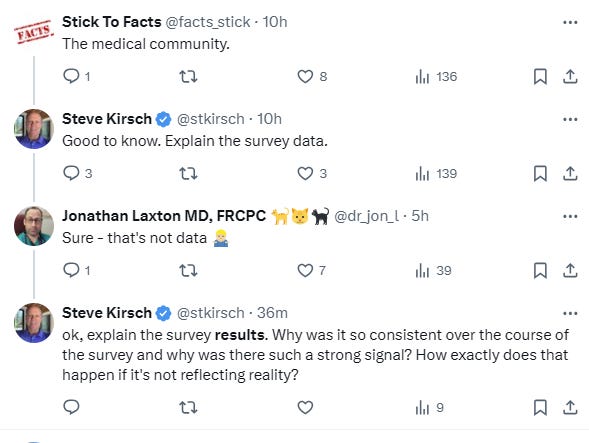
No comments:
Post a Comment